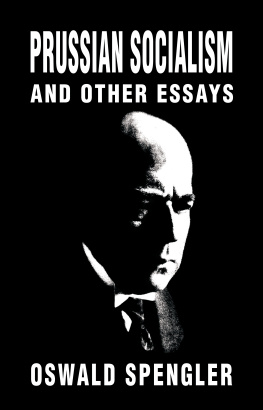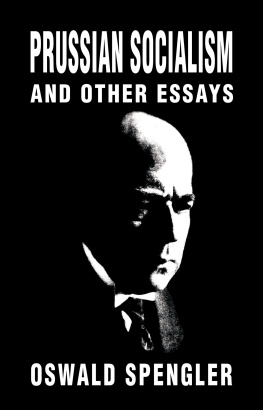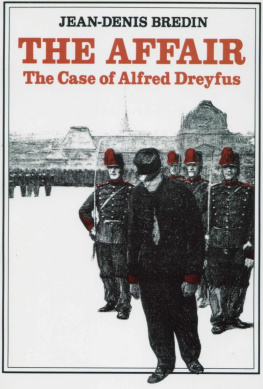Oswald Spengler - Decline of the West
Here you can read online Oswald Spengler - Decline of the West full text of the book (entire story) in english for free. Download pdf and epub, get meaning, cover and reviews about this ebook. year: 2014, publisher: Random Shack, genre: Science / Politics. Description of the work, (preface) as well as reviews are available. Best literature library LitArk.com created for fans of good reading and offers a wide selection of genres:
Romance novel
Science fiction
Adventure
Detective
Science
History
Home and family
Prose
Art
Politics
Computer
Non-fiction
Religion
Business
Children
Humor
Choose a favorite category and find really read worthwhile books. Enjoy immersion in the world of imagination, feel the emotions of the characters or learn something new for yourself, make an fascinating discovery.

- Book:Decline of the West
- Author:
- Publisher:Random Shack
- Genre:
- Year:2014
- Rating:5 / 5
- Favourites:Add to favourites
- Your mark:
- 100
- 1
- 2
- 3
- 4
- 5
Decline of the West: summary, description and annotation
We offer to read an annotation, description, summary or preface (depends on what the author of the book "Decline of the West" wrote himself). If you haven't found the necessary information about the book — write in the comments, we will try to find it.
Decline of the West — read online for free the complete book (whole text) full work
Below is the text of the book, divided by pages. System saving the place of the last page read, allows you to conveniently read the book "Decline of the West" online for free, without having to search again every time where you left off. Put a bookmark, and you can go to the page where you finished reading at any time.
Font size:
Interval:
Bookmark:
A well-formatted version based on the Alfred A. Knopf, 1926 (vol 1) & 1928 (vol 2) editions, translated by Charles Francis Atkinson.
For other well-formatted titles visit:
www.randomshackpublishing.com
Random Shack
2016
I have attempted to remain faithful to the original text in all the essentials, with the following exceptions: Spelling has been modernized in obvious cases; footnotes have been changed to endnotes (and footnotes containing physical page references have been deleted, and many of the hyphenations have been deleted. I understand that Atkinson was attempting to show the literal translation with hyphenated words, but this made for awkward reading (even without the hyphens, the translation is often tedious). I have also, in this electronic edition, eliminated footnotes referencing explicit page numbers in volumes 1 and 2.
No doubt errors remain despite several proofs, but hopefully none that will detract from the material.
David G. Payne
2014, Petoskey
Wenn im Unendlichen dasselbe
It must be left to critics to say whether it was Destiny or Incident using these words in the authors sense that Spenglers Untergang des Abendlandes appeared in July, 1918, that is, at the very turning point of the four years World War. It was conceived, the author tells us, before 1914 and fully worked out by 1917. So far as he is concerned, then, the impulse to create it arose from a view of our civilization not as the late war left it, but (as he says expressly) as the coming war would find it. But inevitably the public impulse to read it arose in and from post-war conditions, and thus it happened that this severe and difficult philosophy of history found a market that has justified the printing of 90,000 copies. Its very title was so apposite to the moment as to predispose the higher intellectuals to regard it as a work of the moment the more so as the author was a simple Oberlehrer and unknown to the world of authoritative learning.
Spenglers was not the only, nor indeed the most popular, philosophical product of the German revolution. In the graver conjunctures, sound minds do not dally with the graver questions they either face and attack them with supernormal resolution or thrust them out of sight with an equally super-normal effort to enjoy or to endure the day as it comes. Even after the return to normality, it is no longer possible for men at any rate for Western men not to know that these questions exist. And, if it is none too easy even for the victors of the struggle to shake off its sequelae, to turn back to business as the normal and to give no more than amateur effort and dilettantish attention to the very deep things, for the defeated side this is impossible. It goes through a period of material difficulty (often extreme difficulty) and one in which pride of achievement and humility in the presence of unsuccess work dynamically together. So it was with sound minds in the post-Jena Germany of Jahn and Fichte, and so it was also with such minds in the Germany of 1919-1920.
To assume the role of critic and to compare Spenglers with other philosophies of the present phase of Germany, as to respective intrinsic weights, is not the purpose of this note nor within the competence of its writer. On the other hand, it is unconditionally necessary for the reader to realize that the book before him has not only acquired this large following amongst thoughtful laymen, but has forced the attention and taxed the scholarship of every branch of the learned world. Theologians, historians, scientists, art critics all saw the challenge, and each brought his apparatus criticu s to bear on that part of the Spengler theory that affected his own domain. The reader who is familiar with German may be referred to Manfred Schroeters Der Streit um Spengler for details; it will suffice here to say that Schroeters index of critics names contains some 400 entries. These critics are not only, or even principally, general reviewers, most of them being specialists of high standing. It is, to say the least, remarkable that a volcanically assertive philosophy of history, visibly popular and produced under a catchy title (Reklamtitel) should call forth, as it did, a special number of Logos in which the Olympians of scholarship passed judgment on every inaccuracy or unsupported statement that they could detect. (These were in fact numerous in the first edition and the author has corrected or modified them in detail in the new edition, from which this translation has been done. But it should be emphasized that the author has not, in this second edition, receded in any essentials from the standpoint taken up in the first.)
The conspicuous features in this first burst of criticism were, on the one hand, want of adequate critical equipment in the general critic, and, on the other, inability to see the wood for the trees in the man of learning. No one, reading Schroeters book (which by the way is one-third as large as Spenglers first volume itself) can fail to agree with his judgment that notwithstanding paradoxes, overstrainings, and inaccuracies, the work towers above all its commentators. And it was doubtless a sense of this greatness that led many scholars amongst them some of the very high to avoid expressing opinions on it at all. It would be foolish to call their silence a sitting on the fence; it is a case rather of reserving judgment on a philosophy and a methodology that challenge all the canons and carry with them immense implications. For the very few who combine all the necessary depth of learning with all the necessary freedom and breadth of outlook, it will not be the accuracy or inaccuracy of details under a close magnifying glass that will be decisive. The very idea of accuracy and inaccuracy presupposes the selection or acceptance of coordinates of reference, and therefore the selection or acceptance of a standpoint as origin. That is mere elementary science and yet the scholar-critic would be the first to claim the merit of scientific rigor for his criticisms! It is, in history as in science, impossible to draw a curve through a mass of plotted observations when they are looked at closely and almost individually.
Criticism of quite another and a higher order may be seen in Dr. Eduard Meyers article on Spengler in the Deutsche Literaturzeitung No. 15 of 1924. Here we find, in one of the great figures of modern scholarship, exactly that large-minded judgment that, while noting minor errors and visibly attaching little importance to them deals with the Spengler thesis fairly and squarely on the grand issues alone. Dr. Meyer differs from Spengler on many serious questions, of which perhaps the most important is that of the scope and origin of the Magian Culture. But instead of cataloging the errors that are still to be found in Spenglers vast ordered multitude of facts, Eduard Meyer honorably bears testimony to our authors erstaunlich umfangreiches, ihm stndig prsentes, Wissen (a phrase as neat and as untranslatable as Goethes exakte sinnliche Phantasie). He insists upon the fruitfulness of certain of Spenglers ideas such as that of the Second Religiousness. Above all, he adheres to and covers with his high authority the basic idea of the parallelism of organically-living Cultures. It is not necessarily Spenglers structure of the Cultures that he accepts parts of it indeed he definitely rejects as wrong or insufficiently established by evidences but on the question of their being an organic structure of the Cultures, a morphology of History, he ranges himself frankly by the side of the younger thinker, whose work he sums up as a bleibendes und auf lange Zeit hinaus nachhaltig wirkendes Besitz unserer Wissenschaft und Literatur. This last phrase of Dr. Meyers expresses very directly and simply that which for an all-round student (as distinct from an erudite specialist) constitutes the peculiar quality of Spenglers work. Its influence is far deeper and subtler than any to which the conventional adjective suggestive could be applied. It cannot in fact be described by adjectives at all, but only denoted or adumbrated by its result, which is that, after studying and mastering it, one finds it nearly if not quite impossible to approach any culture problem old or new, dogmatic or artistic, political or scientific without conceiving it primarily as morphological.
Font size:
Interval:
Bookmark:
Similar books «Decline of the West»
Look at similar books to Decline of the West. We have selected literature similar in name and meaning in the hope of providing readers with more options to find new, interesting, not yet read works.
Discussion, reviews of the book Decline of the West and just readers' own opinions. Leave your comments, write what you think about the work, its meaning or the main characters. Specify what exactly you liked and what you didn't like, and why you think so.






